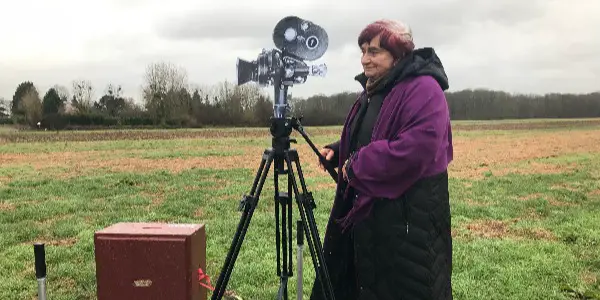Agnes Varda remained a cult figure for the vast majority of her life; an iconic director whose films have only recently started being reevaluated as key texts in the history of European cinema. But the 2017 release of Faces Places, which teamed her up with artist JR in an odd couple road trip for the ages, brought her work to the attention of a new audience – not to mention, her first ever competitive Oscar nomination.
Only a tiny handful of her films were considered a part of “the canon”, and all it took was a quirky crowdpleaser, and her filmography as a whole quite rightly began to be embraced as arguably the best of any filmmaker to have emerged from the French New Wave.
A Disappointing Final Effort
After a nine year absence from making films, Faces Places seemed to have rejuvenated her creativity. But as she was becoming more familiar to younger generations of cinephiles, Varda decided to take the opposite approach to her following essay film, which would sadly be the last to bear her directorial credit. In Varda by Agnes, the great filmmaker looks back upon her entire filmography, and the scenes that have stayed with her through the years, largely presented as a series of discussions in front of live audiences.

What sounds like a triumphant swan song in theory, looking on a lifetime of iconic films and how they affected the way she sees the world, plays out like a DVD extra in practice, often reiterating facts about prior efforts that aren’t new revelations for anybody who has a passing interest in the director’s work. Few filmmakers close out their careers with their strongest films, and even with a newfound burst of creativity following Faces Places, Varda unfortunately isn’t an exception to this rule.
It’s very clear throughout that Varda by Agnes is geared towards audiences less familiar with her work than die hard fans. The audiences at her talks are mostly comprised of young people, with one telling moment featuring Varda asking the audience how many had seen her most famous film, Cleo from 5 to 7. Only a small handful actually raise their hands, and it is to those who kept their hands by their side that this essay film is squarely pitched – it gives an overview of an entire career, making you want to seek out or rewatch the films discussed without spoiling any finer details beyond their production and the small, personal touches within that most would overlook.
A Beginner’s Guide for the Uninitiated
As illuminating as it can be to hear Varda discuss her back catalogue, it’s hard to shake the feeling that we’ve already covered this territory before – and not just because the film plays out like a clip show episode of a sitcom, when the writers haven’t got enough ideas for a full season of episodes. 2008’s The Beaches of Agnes, originally designated by the director as her final film, felt far more conclusive in its self reflexivity, not restricting itself to her filmography but looking through all the different people who have meaningfully impacted her life. Her final film, by contrast, plays largely as a beginner’s guide for the uninitiated, with the insights into the personal stories behind the films diluted somewhat by the fact much of this information is readily available.
Even as a piece of filmmaking, it has dropped much of the playfulness of her previous ventures into documentary features and essay films. A significant chunk of the introductory half hour consists largely of the director speaking at a number of public forums, with archival interludes depicting scenes from some of her most noteworthy films. It’s not that it’s difficult to maintain interest in something that feels like it was created to be supplementary material on a Criterion repackaging of one of her newer releases, so much as the lack of dynamism in how this information is relayed makes it often feel like we’re witnessing a Wikipedia page in motion.
But as it became increasingly clear that this wasn’t aimed at people familiar with much of Varda’s work, and instead to those who were unaware of her until Faces Places, I tried my best to assess with that audience’s mindset. And even then, I’m unsure of what the appeal of this film would be, as it possesses little of the quirky qualities that led her prior effort to become such an unexpected late career revival, dryly fixating on the triumphs of the past without the playfulness that led many to believe more late period triumphs would be on their way.
Varda by Agnes: Conclusion
Varda by Agnes is a disappointing finale to a long and illustrious career, seemingly existing solely to make audiences rush to a back catalogue packed with works more essential than this. If Varda had made another film, I suspect this would have been swept under the carpet and repurposed as a special feature on the DVD.
Varda by Agnes is released in the UK on July 19.
Does content like this matter to you?
Become a Member and support film journalism. Unlock access to all of Film Inquiry`s great articles. Join a community of like-minded readers who are passionate about cinema - get access to our private members Network, give back to independent filmmakers, and more.